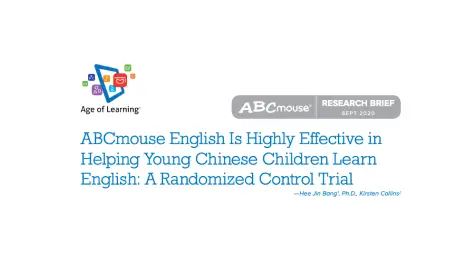Age of Learning regularly sponsors research by independent early education experts to evaluate the effectiveness of ABCmouse. Researchers have completed several large-scale research studies with more than 95,000 children globally, including multiple randomized control trials.
Our latest randomized control trial evaluated the effectiveness of our ABCmouse English program. This self-guided digital learning program was designed by our team of second language acquisition (SLA) researchers, applied linguists, teachers, curriculum specialists, and game developers at Age of Learning to help young learners develop English language skills.
Age of Learning researchers, led by the company’s Director of Efficacy Research and Evaluation Hee Jin Bang, designed the study and then partnered with OneLeap, a design and research consultancy in China, to conduct the study with 122 Chinese children (ages 5-6) and their parents in Hangzhou, China. The primary goal was to understand how effective ABCmouse English was in helping Chinese children develop English language skills.
Results of the trial—which were published in the peer-reviewed CALICO Journal, as well as in Age of Learning Research Briefs in English and Simplified Chinese—showed that beginner English language learners who used ABCmouse English for only ~15–20 minutes daily (an average of 30 hours over 6 months) improved their overall English language skills nearly threefold compared to children in a control group.
Use of ABCmouse English also led to statistically significant improvements across a range of specific language skills, such as vocabulary identification, listening for meaning, speech production, conversation, and pronunciation.
Parents of the children using ABCmouse English reported that their kids developed increased levels of confidence, interest, and motivation to learn English, which are all prerequisites for learning. Additionally, they viewed the program as an effective—and cost-efficient—way to help kids get an early start in English language learning.
For the Age of Learning team behind ABCmouse English, this study also validates the research-based approach—specifically second language acquisition research—they adopted in creating the program.
“Based on the latest research, we designed ABCmouse English to include activities and experiences that engage young learners in familiar contexts, tasks that enable learners to construct knowledge through trial and error, and developmentally appropriate implicit and explicit corrective feedback delivered at the right time,” says head of efficacy research Hee Jin Bang. “We were very pleased to see evidence from this study supporting our belief that a research-informed digital tool can be highly effective in building English language skills of young foreign language speakers, and we are additionally optimistic that these findings can inform other education technology developers seeking to create effective learning resources.”
